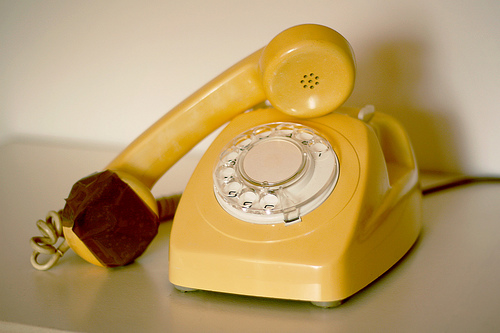Communication is hearing what’s not being said. – Tony Robbins and here

Do you remember rotary dial phones? The tape on the mouth piece reminds us that not all communication comes from voice. What is the body language of the other person? If you are on the phone, how could you possibly know?
What does that mean?
This is a quote that has been said in many ways by many people, but the basic point is always the same. There are always two parts to everything that is communicated. The part that is said, and the part that is not said.
This is true, whether it’s business or pleasure. It’s true with kids or adults. There is what is said (or written), and then there are the omissions (that which is not being said). They may be omitting things they don’t want you to know or are afraid to say.
Whatever the reason for the omission, if you can figure it out, you then better understand them. If you cannot, you’ll never quite get it right. You may get close, but you won’t ever completely understand. And if you’re the speaker, how will you communicate what you don’t say?
Why is communication important?
What if you wanted something (or someone), but kept denying it when you were asked? How would you let it be known that you were omitting something, and that you really meant something else? To me, that is the core of the difficulty of communication.
I imagine most of us have been there at some point in time, when we say one thing, but the other party takes it the wrong way. They missed a clue, or they have a different sense of humor and missed the sarcasm. Then there’s everyone’s favorite answer to the question “What’s wrong?” If they say “Nothing,” then you know somethings wrong, right?
Being able to hear what has not been said is crucial to understanding what they mean, even if it’s not what they said. Communication is the term we use to describe the action of moving an idea or an emotion from one person to another. If you missed part of it, you don’t have the whole story or the whole picture, right?
Where can I apply this in my life?
Think about all the times in your life when you blew it. Someone said something and you just didn’t get what they were trying to communicate. Or perhaps you have more experience at saying the wrong thing, or otherwise not getting your true intent communicated despite your words.
How often does these mis-communications happen, and how severe are the consequences? What is the most common way you fail when you are trying to communicate? What do you most often miss when someone else is trying to communicate with you?
First let’s consider how eloquent you are. Those who are quite eloquent can skip over these next few paragraphs. For the rest of us, let’s try to figure out just what goes wrong and how we might be able to get a little better at it.
Is there something common in the times you aren’t particularly effective at communicating? For me, it’s always been either not making my sarcasm clear enough, or failing to take the sensitivities of the other person into account.
The former is easily fixed, use less sarcasm or make it very clear. The other requires more people skill than I have, but I can try to be a bit more careful with my choice of words, so as to minimize the risk that I will offend on accident.
What can you do to try to help yourself be more clear and offend less? How will you help yourself be aware of when you might be treading too close to the edge? The sooner you notice that something is headed in the wrong direction, the sooner you can adjust what you are doing, and communicate better.
The second half of communication is listening. What else did you hear when they are done talking? What did you notice they failed to say, or tried to keep from you? Whether it’s a question they asked you, or an answer that they provided, did you understand what they really meant?
Unfortunately, while I can tell I messed up (in hindsight), I’m really not an expert on this part. I’m not a people person. Anyone with ideas is welcome to provide them in the comments section, and will be greatly appreciated (by myself, if by no one else).
With any skill, communication takes practice. Experience comes from making mistakes. If you don’t try, how will you make mistakes? You can also learn by watching those who do it well, and trying to imitate what they do, as best as you possibly can to improve your skill level.
Communication is what we call the art of moving thoughts, ideas, and emotions from one person to another. How well do you provide communication, and how well do you receive communication? It is an essential life-skill, one would be wise to master it.
And, as usual, honesty tends to be the best policy, in the long run at least. You might want to try making it your default method of communication.
From: Twitter, @AnthonyJConklin
confirmed at : http://www.livestrong.com/winning-voices/tony-robbins/
Photo by mollybob
